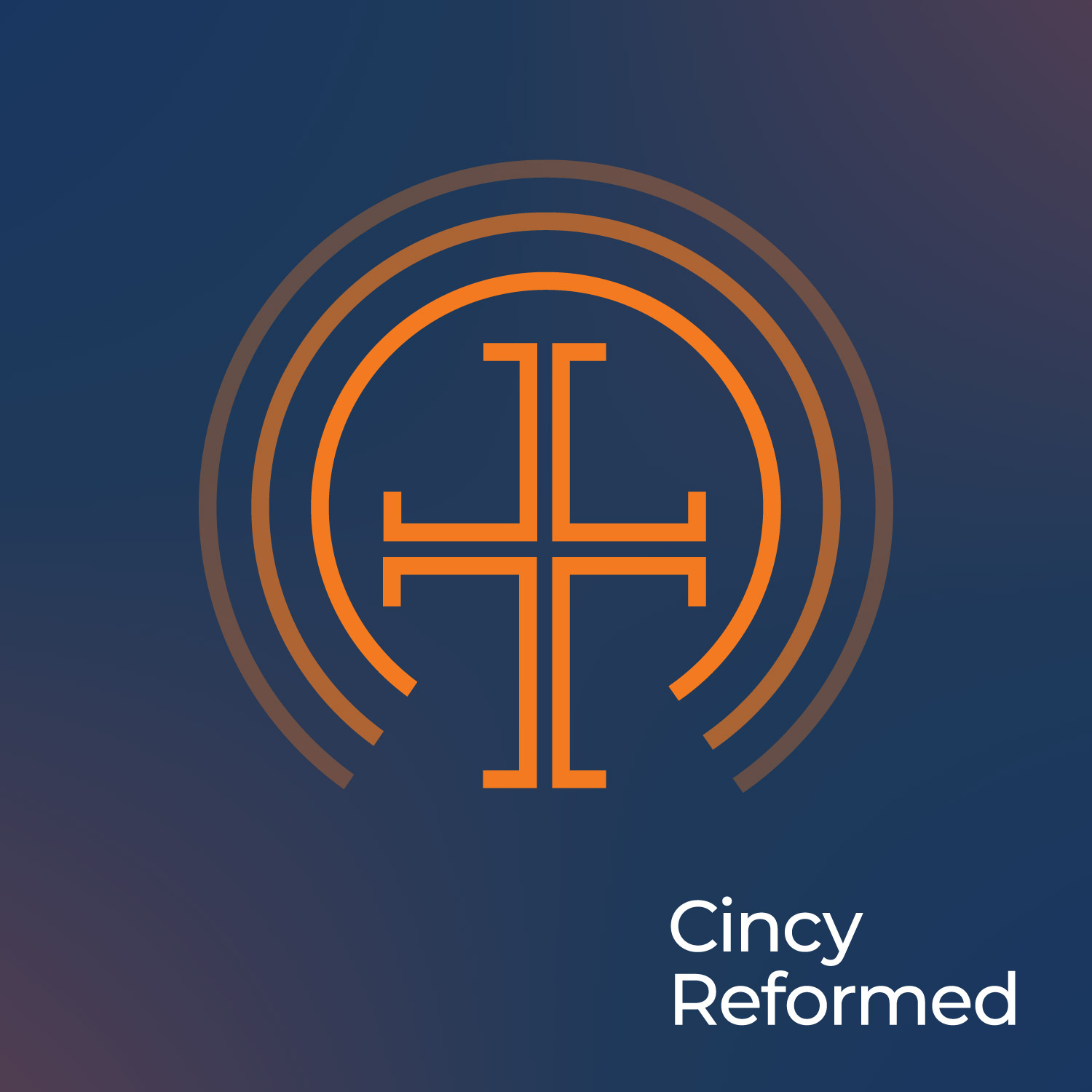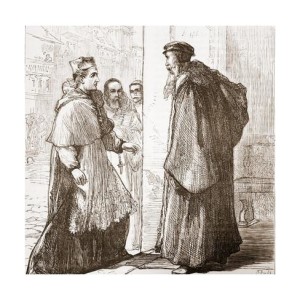
23.7K
Downloads
318
Episodes
Cincy Reformed Podcast is a podcast of Westside Reformed Church (URCNA) in Cincinnati, OH. Pastors Zac (Mdiv, Westminster Seminary California) and Brandon (MAR, Westminster Theological Seminary) discuss matters of theology, history, apologetics, contemporary issues, and more.
Episodes

Monday May 16, 2022
Reformed Catholic vs. Roman Catholic - Part 5: The Eucharist
Monday May 16, 2022
Monday May 16, 2022
Was Jesus's sacrifice on the Cross "once for all," or is it to be repeated daily or weekly? Does the Word have primacy in a worship service, or is it the Lord's Supper (Eucharist)? Is the Eucharist our work toward God, or God's action toward us? In this episode, Pastor's Brandon and Zac discuss the differences between the Reformed Church and the Roman Church regarding the sacrament of the Lord's Supper.
For more information, see:
The Lord's Supper: Answers to Common Questions by Keith Mathison
The Lord's Supper by Thomas Watson
The Lord's Supper as a Means of Grace: More Than Just a Memory by Richard Barcellos
Reformed Dogmatics (Vol. 5) by Geerhardus Vos
Between Wittenberg and Geneva: Lutheran and Reformed Theology in Conversation (ch. 7) by Robert Kolb and Carl Trueman
Why The Reformation Still Matters by Michael Reeves
The Lord's Supper and the Popish Mass by Cornelius Venema
Treatises on the Sacraments by John Calvin
Thinking God's Thoughts: An Introduction to a Pilgrim Worldview (ch. 17) by J. Brandon Burks
What Happens When We Worship? by Jonathan Cruse
Are We Together? A Protestant Analyzes Roman Catholicism by R.C. Sproul
Far From Rome, Near to God: Testimonies of Fifty Converted Catholic Priests by Richard Bennett
A Reformed Catholic by William Perkins

Monday May 16, 2022
Reformed Catholic vs. Roman Catholic - Part 5: The Eucharist (Audio only)
Monday May 16, 2022
Monday May 16, 2022
Was Jesus's sacrifice on the Cross "once for all," or is it to be repeated daily or weekly? Does the Word have primacy in a worship service, or is it the Lord's Supper (Eucharist)? Is the Eucharist our work toward God, or God's action toward us? In this episode, Pastor's Brandon and Zac discuss the differences between the Reformed Church and the Roman Church regarding the sacrament of the Lord's Supper.
For more information, see:
The Lord's Supper: Answers to Common Questions by Keith Mathison
The Lord's Supper as a Means of Grace: More Than Just a Memory by Richard Barcellos
Reformed Dogmatics (Vol. 5) by Geerhardus Vos
Between Wittenberg and Geneva: Lutheran and Reformed Theology in Conversation (ch. 7) by Robert Kolb and Carl Trueman
The Lord's Supper and the Popish Mass by Cornelius Venema
Thinking God's Thoughts: An Introduction to a Pilgrim Worldview (ch. 17) by J. Brandon Burks
Are We Together? A Protestant Analyzes Roman Catholicism by R.C. Sproul
Far From Rome, Near to God: Testimonies of Fifty Converted Catholic Priests by Richard Bennett
A Reformed Catholic by William Perkins

Tuesday May 10, 2022
Reformed Catholic vs. Roman Catholic - Part 4: Mary and the Saints
Tuesday May 10, 2022
Tuesday May 10, 2022
Should we pray to Mary and the Saints? Can they hear our prayers? Does Mary help to save us from our sins? In this episode, Pastors Zac and Brandon compare and contrast the Reformed view with the Roman view on Mary and the Saints in order to bring out greater understanding between the two traditions.
For more information, see:
Heidelberg Catechism, Q. 30
Mary, the Old Testament, and the Roman Catholic "Leap" by Mark Garcia
Rescuing Mary from Rome: The Virgin in Scripture, Theology, and the Church by Mark Garcia
Should We Pray to the Saints in Heaven? by Zacharias Ursinus
Can praying to Mary or the saints keep a professing Christian out of heaven? by R.C. Sproul
Are We Together? A Protestant Analyzes Roman Catholicism by R.C. Sproul
Far From Rome, Near to God: Testimonies of Fifty Converted Catholic Priests by Richard Bennett
A Reformed Catholic by William Perkins

Monday May 09, 2022
Monday May 09, 2022
Should we pray to Mary and the Saints? Can they hear our prayers? Does Mary help to save us from our sins? In this episode, Pastors Zac and Brandon compare and contrast the Reformed view with the Roman view on Mary and the Saints in order to bring out greater understanding between the two traditions.
For more information, see:
Heidelberg Catechism, Q. 30
Mary, the Old Testament, and the Roman Catholic "Leap" by Mark Garcia
Rescuing Mary from Rome: The Virgin in Scripture, Theology, and the Church by Mark Garcia
Are We Together? A Protestant Analyzes Roman Catholicism by R.C. Sproul
Far From Rome, Near to God: Testimonies of Fifty Converted Catholic Priests by Richard Bennett
A Reformed Catholic by William Perkins

Monday May 02, 2022
Reformed Catholic vs. Roman Catholic - Part 3: The Pope and Church Structure
Monday May 02, 2022
Monday May 02, 2022
Is the Pope the "head of the church"? Does Matthew 16 teach apostolic succession or doctrinal succession? Should there be an earthly man at the top of the church hierarchy? In this episode, Pastors Zac and Brandon discuss the Reformed view of church polity as compared to the Roman Catholic view.
For more information, see:
Was Peter the First Pope (Matthew 16)? by Cincy Reformed
Belgic Confession, Art. 27-31
Canons of Dort, 1.7
The Church by Edmund Clowney
Institute of the Christian Religion by John Calvin, Book 4, ch. 2-11.
How Jesus Runs the Church by Guy Prentiss Waters
Are We Together? A Protestant Analyzes Roman Catholicism by R.C. Sproul
Far From Rome, Near to God: Testimonies of Fifty Converted Catholic Priests by Richard Bennett
A Reformed Catholic by William Perkins

Sunday May 01, 2022
Sunday May 01, 2022
Is the Pope the "head of the church"? Does Matthew 16 teach apostolic succession or doctrinal succession? Should there be an earthly man at the top of the church? In this episode, Pastors Zac and Brandon discuss the Reformed view of church polity as compared to the Roman Catholic view.
For more information, see:
Was Peter the First Pope (Matthew 16)? by Cincy Reformed
Belgic Confession, Art. 27-31
Canons of Dort, 1.7
The Church by Edmund Clowney, ch. 14
Institute of the Christian Religion by John Calvin, Book 4, ch. 2-11.
How Jesus Runs the Church by Guy Prentiss Waters
Are We Together? A Protestant Analyzes Roman Catholicism by R.C. Sproul
Far From Rome, Near to God: Testimonies of Fifty Converted Catholic Priests by Richard Bennett
A Reformed Catholic by William Perkins

Monday Apr 25, 2022
Reformed Catholic vs. Roman Catholic - Part 2: Justification and Sola Fide
Monday Apr 25, 2022
Monday Apr 25, 2022
"What must I do to be saved?" is a central question asked in the Gospels. However, the Reformed Church and the Roman Catholic Church have given antithetical answers to this key question. According to the Reformed Church, justification is on the grounds of Jesus's imputed righteousness which is received by faith alone. Good works, then, are a fruit of justification - never the root. As Richard Gaffin said, love "is not identical with faith, but its fruit or result," and good works are "expressions" of a believer's saving faith. Roman Catholicism, however, has declared those who believe this to be "Anathema" (eternally damned). In this episode, Pastors Brandon and Zac continue the series that is comparing and contrasting the Reformed Church with the Roman Catholic Church in order to gain clarity and understanding, which can best lead to more fruitful dialogue.
For more information, see:
Belgic Confession, Art. 22-23
Heidelberg Catechism, Q 60-65
Canons of Dort, Rejection of Errors
Justified in Christ: God's Plan for Us in Justification ed. by K. Scott Oliphint
Are We Together? A Protestant Analyzes Roman Catholicism by R.C. Sproul
By Faith, Not By Sight: Paul and the Order of Salvation by Richard B. Gaffin, Jr.
Redemption Accomplished and Applied by John Murray
The Whole Christ: Legalism, Antinomianism, and Gospel Assurance by Sinclair Ferguson
Far From Rome, Near to God: Testimonies of Fifty Converted Catholic Priests by Richard Bennett
How Can Justification Make Me Joyful? by Daniel Hyde
Reformed Dogmatics (vol. 4, ch. 5) by Geerhardus Vos
Redemptive History and Biblical Interpretation (ch. 7, 21) by Geerhardus Vos
A Reformed Catholic by William Perkins

Monday Apr 25, 2022
Monday Apr 25, 2022
"What must I do to be saved?" is a central question asked in the Gospels. However, the Reformed Church and the Roman Catholic Church have given antithetical answers to this key question. According to the Reformed Church, justification is on the grounds of Jesus's imputed righteousness which is received by faith alone. Good works, then, are a fruit of justification - never the root. As Richard Gaffin said, love "is not identical with faith, but its fruit or result," and good works are "expressions" of a believer's saving faith. Roman Catholicism, however, has declared those who believe this to be "Anathema" (eternally damned). In this episode, Pastors Brandon and Zac continue the series that is comparing and contrasting the Reformed Church with the Roman Catholic Church in order to gain clarity and understanding, which can best lead to more fruitful dialogue.
For more information, see:
Belgic Confession, Art. 22-23
Heidelberg Catechism, Q 60-65
Canons of Dort, Rejection of Errors
Justified in Christ: God's Plan for Us in Justification ed. by K. Scott Oliphint
Are We Together? A Protestant Analyzes Roman Catholicism by R.C. Sproul
By Faith, Not By Sight: Paul and the Order of Salvation by Richard B. Gaffin, Jr.
Redemption Accomplished and Applied by John Murray
The Whole Christ: Legalism, Antinomianism, and Gospel Assurance by Sinclair Ferguson
Far From Rome, Near to God: Testimonies of Fifty Converted Catholic Priests by Richard Bennett
How Can Justification Make Me Joyful? by Daniel Hyde
Reformed Dogmatics (vol. 4, ch. 5) by Geerhardus Vos
Redemptive History and Biblical Interpretation (ch. 7, 21) by Geerhardus Vos
A Reformed Catholic by William Perkins

Monday Apr 18, 2022
Reformed Catholic vs. Roman Catholic - Part 1: Authority and Sola Scriptura
Monday Apr 18, 2022
Monday Apr 18, 2022
In this five-part series, Pastors Zac and Brandon compare and contrast the teachings of the Reformed Church with the Roman Catholic Church in order to gain clarity, and to sharpen our understanding of each tradition. In this first episode, the pastors take up the issue of authority, Scripture, and church tradition.
For more information, see:
The Belgic Confession, Art. 7 (c.f., Art. 3-7)
Reformed Dogmatics (Vol.1, ch.11-14) by Herman Bavinck
God's Word Alone: The Authority of Scripture by Matthew Barrett
The Canon Revisited: Establishing the Origins and Authority of the New Testament Books by Michael Kruger
Did God Really Say?: Affirming the Truthfulness and Trustworthiness of Scripture ed. by David Garner
Thy Word is Still Truth: Essential Writings on the Doctrine of Scripture from the Reformation to Today ed. by Peter Lillback
The Doctrine of Scripture by Cornelius Van Til
A Reformed Catholic by William Perkins

Monday Apr 18, 2022
Monday Apr 18, 2022
In this five-part series, Pastors Zac and Brandon compare and contrast the teachings of the Reformed Church with the Roman Catholic Church in order to gain clarity, and to sharpen our understanding of each tradition. In this first episode, the pastors take up the issue of authority, Scripture, and church tradition.
For more information, see:
The Belgic Confession, Art. 7 (c.f., Art. 3-7)
Reformed Dogmatics (Vol.1, ch.11-14) by Herman Bavinck
God's Word Alone: The Authority of Scripture by Matthew Barrett
The Canon Revisited: Establishing the Origins and Authority of the New Testament Books by Michael Kruger
Did God Really Say?: Affirming the Truthfulness and Trustworthiness of Scripture ed. by David Garner
Thy Word is Still Truth: Essential Writings on the Doctrine of Scripture from the Reformation to Today ed. by Peter Lillback
A Reformed Catholic by William Perkins
